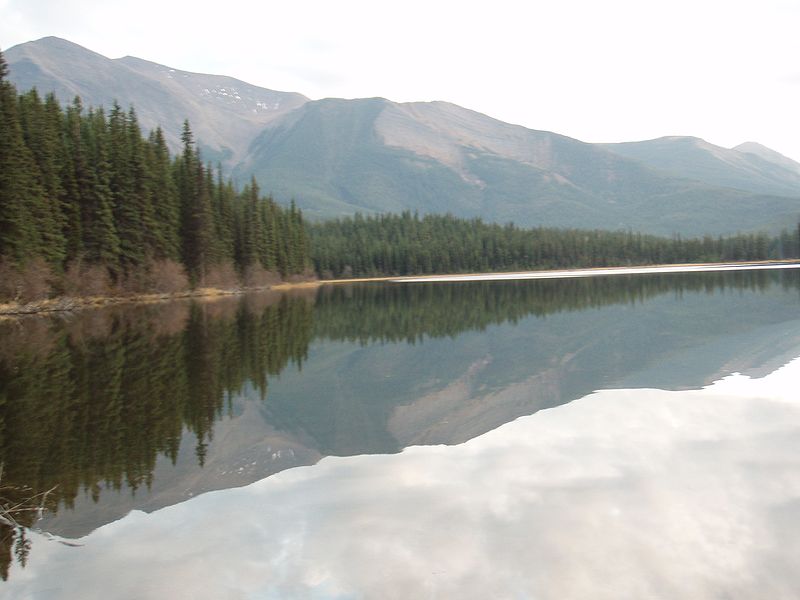.

The silence of eternity
Is like organized crime
It spreads its roots everywhere
In these lacustrine retreats
We inhabit Goodbye, Lake
Poets! The radio is chinking out
Caprice Espagnole by Lao-Tree
Its cold tinkling magic echoes across the peaks
Is like organized crime
It spreads its roots everywhere
In these lacustrine retreats
We inhabit Goodbye, Lake
Poets! The radio is chinking out
Caprice Espagnole by Lao-Tree
Its cold tinkling magic echoes across the peaks

Lake Life I want to take a bath
In you and forget death
Waits at the muddy bottom
Although I live in the tree
Of poetry and sing I have no
Water wings
And fear death by drowning
In a mirror image
In you and forget death
Waits at the muddy bottom
Although I live in the tree
Of poetry and sing I have no
Water wings
And fear death by drowning
In a mirror image

Morning mist on Lake Mapourika, New Zealand: photo by Richard Palmer, 2004
Canadian lake: photo by Mattkenn3, 2006
A little lake in the Canadian Rockies: photo by Helios, 2006



15 comments:
Beautiful entry tom:
Pictures are too perfect,
Words are too human
some taken from the camera
some from the language
getting one next to the other
make a single one whole
Mariana.
Many thanks.
"getting one next to the other
make a single one whole"
That's exactly the plan.
A dense little poem, a complex network of sounds and associations. The echoes--across the peaks of the poem--of Ashbery in line 4 and Eliot in the penultimate line remind me a little of a Ted Berrigan sonnet. Lao-Tree seems to be a forestry project grafted onto the father of Taoism--and I have an inkling that the Chineseness of the latter relates to "chinking." And of course that "ink" sound tintinnabulates again in "tinkling." The ending stunned me--put me in mind of Baudelaire's "Albatross." It suggests that a poet keeps aloof from life because he can't function in it ("I have no water wings")and because he fears that life will show him the truth about himself ("fear death by drowning in a mirror image"). In solitude he's free to imagine himself anything he likes. I hope my take on your poem isn't too idiosyncratic! I'm just trying to say that it repays close reading, that I like it.
David,
As is the way with any insightful objective "outside reading" of a poem, this one of yours (for which by the way I am extremely grateful!) reveals to me aspects of what I'm doing that I had not fully cognized. And maybe a good thing at that. The mirror reflections, whether or not flattering (and hopefully for the honesty of any writer, mostly they are the latter), are most informative in passing, I find, but getting too close can be dangerous.
Incidentally the lake where the poem was written was fairly shallow. But I suppose one can drown in two feet of water. As it happens not long ago I saw someone come very close to drowning, and later discussed the experience with others, including some equally shaken fellow witnesses. Some in the discussion who had not been present opined that it would be a good way to go--quick at least. Those of us who'd been there tended to disagree. To each his own ending...
Le Poëte est semblable au prince des nuées
Qui hante le tempête et se rit d'archer;
Éxilé sur le sol au milieu des huées,
Ses ailes de géant l'empêchent de marcher.
I suppose Big Bird could easily have drowned in two feet of water, were he poetically inclined.
Lovely poem, Tom. I just bought Walon some water wings. We'll see how long he needs them.
Dale,
This German brand comes guaranteed for a Thousand Years. (Identities concealed in case any of the little waterbugs grows up to be Reichschancellor.)
Schwimmflügeln
Lovely, eerie poem. And Schwimmflügeln is definitely the funniest word I've heard all week.
Rachel,
Kind words from a discriminating reader, many thanks. Yes, Schwimmflügeln -- a linguistic aquatic giggle that made my day as well. (Pondered a bit on the motives of that photo-poster, but oh well, gift horse..or should I say seahorse?)
"We inhabit Goodbye, Lake
Poets!"
Don't we just.
Bill,
That was an odd stroke of luck. There were meant to be three empty spaces before "Goodbye", but I'd forgotten Blogger imposes a one-format-fits-all/no eccentricities rule when it comes to spacing. (Well, half-forgotten, half tossed fate to the winds.) (No mute inglorious Olsons here.) Anyway, as usual the enforced abdication of eccentric spacing proved an undeserved benison.
(Goodbye may be a nice place to visit, but would we like to stay?)
(Goodbye may be a nice place to visit, but would we like to stay?)
As people, that's one thing, but as poets, aren't we always in Goodbye? Goodbye to the last poem/book, to our childish dreams of fame and a Nobel prize(!), Goodbye to all that, as a poet once wrote.
Billy,
I suppose RG had it right, but there's always so much more of "all that" being added to the total, it makes the Goodbye-saying almost continuous.
Then again, perhaps redundant as well, as Hardy suggests in "Without Ceremony":
...You were all of a sudden gone
Before I had thought thereon,
Or noticed your trunks were down.
So now that you disappear
For ever in that swift style,
Your meaning seems to me,
Just as it used to be
'Good-bye is just not worth-while!'
(That last line of the penultimate stanza always has the unfortunate effect on me of making me wonder if TH was perhaps simply not the noticing sort??)
I find myself woefully prone to a warped sort of oblique valediction:
Last Chance
The Long Goodbye
& c.
Some farewells are admittedly terrible, but that goodbye to the last poem/book seems relatively easy, given as I say there's usually soon a next one, which reminds me, congratulations on your new book!
I suppose my favourite "goodbye line" is that uttered not by a poet but by Czar Nicholas, an instant before his execution by the Bolshies, at Ekaterinburg, July 16, 1918:
"What?"
But all I can say, almost finally, Bill, is Atque, in perpetuum, frater, ave atque vale.
Which, inevitably, reminds me of George Moore and the most sustainedly nasty but funny goodby in the history of literature.
Thanks for the congrats; I'm expecting copies any day now. With any luck, sales will reach double figures withing the year!
Post a Comment